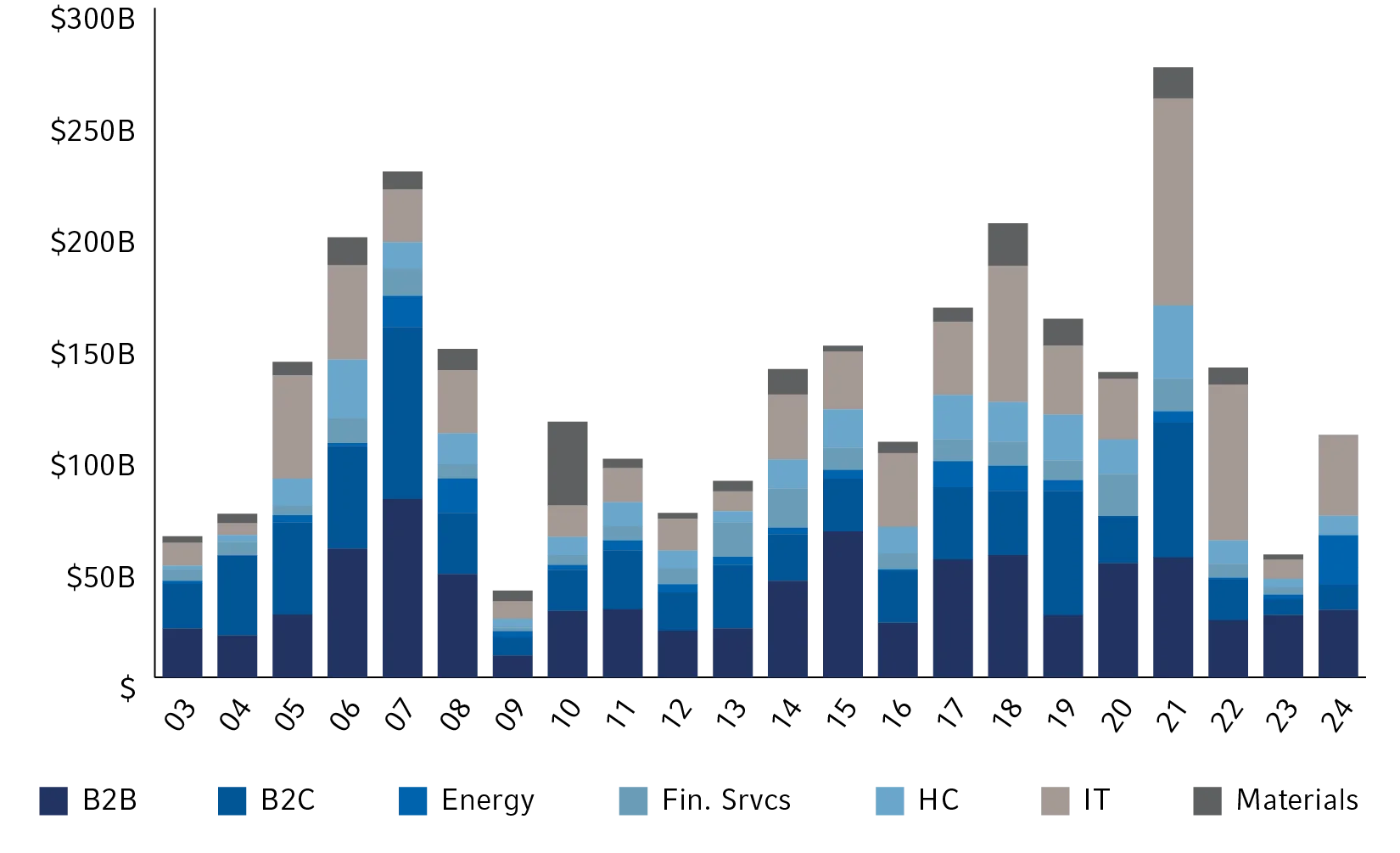The game plan for building more innovative, resilient portfolios in the face of uncertainty.
As the economic landscape continues to evolve—with heightened volatility in money markets, fluctuating inflation expectations, and tightening liquidity conditions—private markets are emerging as an essential component of modern portfolios. Investors are increasingly turning to private assets for the potential of enhanced returns, greater diversification, and insulation from public market swings.
Still, private investments are not without complexity. They require a long-term view, rigorous diligence, and careful planning—especially in today's environment. One of the most common pitfalls we see is investors entering the space without a clear strategy. Private investments are not one-size-fits-all. To truly unlock their value, investors need access to a diversified range of opportunities across private equity, venture capital, infrastructure, real estate, and private credit.

Vic Leverett
Managing Director, Head of Alternative Investments
Success in private markets depends on more than just timing. It requires knowing where to look and who to partner with. It means being able to balance opportunity with liquidity. With the right playbook—and access to the right managers—investors can build more resilient portfolios and help clients meet their long-term goals, even amid uncertainty. At Russell Investments, we recognize that every investor's journey is different. We're well-positioned to offer the access and expertise to get you where you want to go.
What's moving markets
Macro Volatility and Monetary Policy
Recent swings in money markets reflect deep uncertainty around the path of interest rates and inflation. Central banks remain cautious, and higher-for-longer rate scenarios are adding pressure to traditional fixed income. In contrast, private credit and real asset strategies are emerging as compelling alternatives, offering potentially higher yields and better risk-adjusted returns.
Tariffs and Trade Tensions
With the Trump administration signaling a return to protectionist trade measures, including the reintroduction of tariffs on key imports, global supply chains could face renewed disruption. While this creates headwinds for some sectors, it also presents opportunities for private capital to fund domestic infrastructure, manufacturing reshoring and supply chain modernization. Investors should be alert to how these dynamics may impact valuations, especially in sectors like industrials, logistics and technology hardware.
Regulatory Winds
A more business-friendly regulatory tone under the Trump administration may favor private sector expansion, with looser rules and lower taxes possibly boosting M&A activity. For private equity, this could translate into increased deal flow and new opportunities in both the middle and large-cap markets. Globally, regulatory divergence continues, with varied risks and opportunities across Europe, Asia and the Middle East.
Need for Security
Rising geopolitical instability and the growing reliance on digital infrastructure are leading to greater investment in cybersecurity, cloud resilience, and data sovereignty. Governments and corporations alike are prioritizing spending in this space, creating new avenues for private capital to fund innovation and infrastructure.
Alternative Liquidity Sources
While IPO markets remain choppy, secondary transactions—including GP-led continuation vehicles—are gaining traction as viable exit paths. These mechanisms are critical in maintaining flexibility and liquidity for investors, particularly in a tighter capital-raising environment.
The Playbook
How can investors position themselves to take advantage of these opportunities? The answer is to consider a meaningful allocation to private investments across different segments.
Private Equity
We see more scrutiny on consolidation strategies and growing potential in non-U.S. markets.
- U.S. market: An increasingly pro-business climate in the U.S. will likely drive corporate activity. We believe taking a targeted approach focused on growth themes including reindustrialization, supply chain resilience and strategies at the intersection of government-private sectors, remains attractive.
- Artificial intelligence and automation: The accessibility of AI, automation and new system integration tools should support consolidation strategies across service sectors, from autobody shops to accounting firms.
- Global: Outside of North America, we see potential in less traditional centers of private capital formation, including Japan, Asia-ex China and the Middle East. In Japan, 2025 should reveal whether corporate deal flow matches the private capital funding flows.
With public markets shrinking, private equity buyouts provide investors access to a broader opportunity set, enhancing returns through operational improvements, strategic repositioning, and sector expertise.

Vic Leverett
Managing Director, Head of Alternative Investments
Buyout Bounce Back
European private equity buyouts have risen off their 2022 lows.
Invested capital by primary sector

Source: Pitchbook
How to play it
Private equity continues to attract investors seeking higher returns and broad diversification. It provides exposure to operational improvements and strategic repositioning of companies not presently in listed markets. Private equity also allows investors to emphasize emerging trends in their portfolios such as reindustrialization, the energy transition and AI.
Venture Capital
AI will drive more productivity and fresh opportunities across industry and defense.
- AI adoption: AI will continue to move further into the mainstream with innovations such as AI agents and virtual collaborators. However, widespread acceptance also means growth is likely fully priced into financing rounds. As a result, we tend to favor earlier-stage investing.
- Hardware and data ownership: AI-driven code generation is changing the economics of software development, shifting the competitive advantage toward data and hardware. Technology breakthroughs are poised to make hardware more capital-efficient and investable. Governments are also prioritizing related sectors, pairing private sector capital with expanded sources of non-dilutive funding—all of which will support a flurry of new companies.
- Digitization: The digitization of physical industries and the momentum in robotics, autonomous systems, and defense technology will continue to unlock new innovations and revenue streams in these sectors. We maintain strong convictions in opportunities across cybersecurity, "immersion" themes, bio-health, industrial automation, and hard tech.
With companies staying private longer, venture capital broadens investor access to high-growth opportunities and complements small cap exposure in a shifting market landscape.

Samuel Pittman, Ph.D.
Managing Director, Co-Head of Strategic Asset Allocation
Higher Valuations
Early-stage U.S. companies have seen valuations return to 2021 levels.
Median pre-money and median post-money valuations

Source: Pitchbook
How to play it
With the number of public market companies shrinking and private companies increasing, venture capital has become essential for accessing early-stage innovation. Allocating to venture capital not only provides exposure to these transformative companies early on but also helps investors maintain broad small-cap diversification.
Private Real Estate
Private real estate is in a period of recovery, offering meaningful value in both listed and unlisted markets.
- Relative value: When listed and non-listed real estate assets are combined, the disparate characteristics can offer investors tangible relative value to trade mispriced securities and build or buy a broader array of property types across markets.
- Market stabilization: On a trailing three-year basis through year-end 2024, both listed and non-listed real estate underperformed equities by double digits. We expect this performance delta to narrow in upcoming vintages. With high volatility in rates, new construction has slowed meaningfully across sectors, allowing for occupancies to stabilize and rents to increase in existing assets.
- Europe: Rates may not moderate as expected, putting continued pressure on assets previously financed in less restrictive capital markets. We anticipate private core real estate valuations to bottom out this year while capital competes with nearly 8% yields available in areas such as investment-grade corporate mortgage-backed securities. As European markets are more heavily banked, with no real CMBS market, we think any bank retrenchment could still impact European equity values disproportionately, extending prospects for debt and non-core strategies.
The current environment presents compelling entry points for long-term investors to gain access to the inflation-hedging properties of real estate in their portfolios.

Amneet Singh
Director, Asset Allocation Strategy
Transactions Rebound
North American private real estate transactions have ticked up over the past year.
Volume of transactions by sector

Source: MSCI Real Capital Analytics
How to play it
Rental income from real estate typically keeps pace with inflation over the long term, making it an essential asset class today. While office real estate remains stressed post-COVID, sectors like logistics and data centers are well-positioned to benefit from AI-driven demand. Real estate is an essential exposure in a total portfolio solution.
Private Infrastructure
Private infrastructure is positioned for growth, driven by inflation-linked cash flows and demand in digital and energy sectors, with risks from oversupply and geopolitics.
- Energy infrastructure: The growth in demand for energy continues to encompass one of the most important areas for private capital mobilization. Whether from renewable sources or traditional fuels providing electrons to power-hungry economies around the world is a growing area of opportunity.
- Digital infrastructure: With the advent of AI, acute deficits in the supply of both power and water to meet demand will need to be addressed. Data center demand is also high; although, it's worth noting the potential for a supply overhang at some point is not low. This will make general partner skills and manager selection more vital.
- Geopolitics: For Europe, the push to stay competitive could lead to outsourcing a large portion of the AI tech stack to more energy-abundant regions. In addition, the path of the energy transition in Europe and a potential resumption of energy flows from Russia could also influence infrastructure investment.
Infrastructure is at the heart of global transformation, offering stability, opportunity, and resilience in a shifting landscape.

Pierre Dongo-Soria, CFA
Principal Investment Strategist, EMEA
Rise in Renewables
Renewables make up an increasing share of power generation in North America.
Power generation by fuel source, as a percentage of total power generated

Source: International Energy Agency
How to play it
The energy transition and the build-out of AI models are driving massive infrastructure investments that will add to mature infrastructure segments like ports and communication networks. Infrastructure, with its inflation-hedging properties and its importance to the global economy, is a natural choice for a strategic allocation.
Private Credit
Senior security lending and asset-backed strategies thrive in private credit, with evergreen funds offering flexibility.
- Senior secured lending: Senior secured lending, which has first claim on cash flows, is preferred for both corporate and real assets. Since much of the private credit market is floating rate, elevated base rates mean lenders will continue to absorb more cash flow. Elevated financing costs start to place more pressure on junior facilities and lower-quality sponsor-backed borrowers.
- Asset-based lending: Lending against specific assets (asset-backed and asset-based) is preferred to lending on broader enterprise operating income or EBITDA (cash flow lending). As the need for capital expenditure grows, we think more innovation is coming to fund assets in non-bank markets.
- Evergreen vehicles: With uncertainty over the path of rates, we see funds just beginning their investment cycle (early in lock-up periods), with fresh capital having more flexibility and a strategic deployment advantage in upcoming vintages. While these structures offer greater liquidity, they are not meant to house longer duration non-performing or distressed strategies. Should the non-bank lending market be tested by an extended period of defaults, closed-end credit specialists and an active secondary market will be available to provide solutions. Therefore, diversification by strategy and outperformance tied to manager selection is essential.
Private credit has generated strong investment returns on par with equity, albeit with much lower volatility, making it an important slice in an efficient portfolio.

Keith Brakebill
Director, Senior Portfolio Manager – Private Credit
Size Matters
Medium-sized funds are most common
Private debt funds by fund size, as a percentage of total funds

Source: Pitchbook
How to play it
The private credit market is growing rapidly, to where it is now a substantial portion of sub-investment-grade lending. A diversified strategic asset allocation that includes sub-investment-grade fixed income should augment listed high-yield bonds and bank loans with private debt.
The bottom line
In the months ahead, we believe private markets will be redefined by a changing regulatory backdrop, new security requirements and fluctuating liquidity dynamics. This should create a host of new opportunities, albeit with heightened complexities. By deploying every tool in the playbook, investors can capture high-growth opportunities and unlock value across emerging sectors and regions, fueling breakthroughs that shape the future. To wit, the resurgence in private markets is already underway.
Private Markets Power through every market cycle
Learn more about private market opportunities at Russell Investments
Explore now

